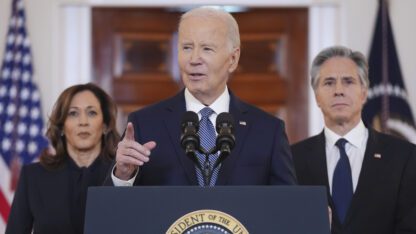The Atlanta-based U.S. Centers for Disease Control and Prevention could see big changes under President-elect Donald Trump.
He’s threatened cuts to public health efforts, and has promised to give longtime anti-vaccine activist Robert F. Kennedy Jr. free rein on health as his choice to lead the U.S. Department of Health and Human Services, which includes the CDC.
“I’m very concerned about the history of statements that consistently promote false information and misinformation about vaccines,” said former CDC Director Dr. Tom Frieden, who is now president and CEO of the nonprofit Resolve to Save Lives. “The way that RFK Jr. has done that persistently has been irresponsible. There is clear evidence about, for example, the measles vaccine not being associated with autism, and that’s something he has continued to raise.”
Frieden said such statements fuel fear about a vaccine that has saved millions of lives around the world.
“And that’s a preventable infection. The measles virus itself is highly infectious, and so we need high vaccination rates or measles will come back,” he said.








